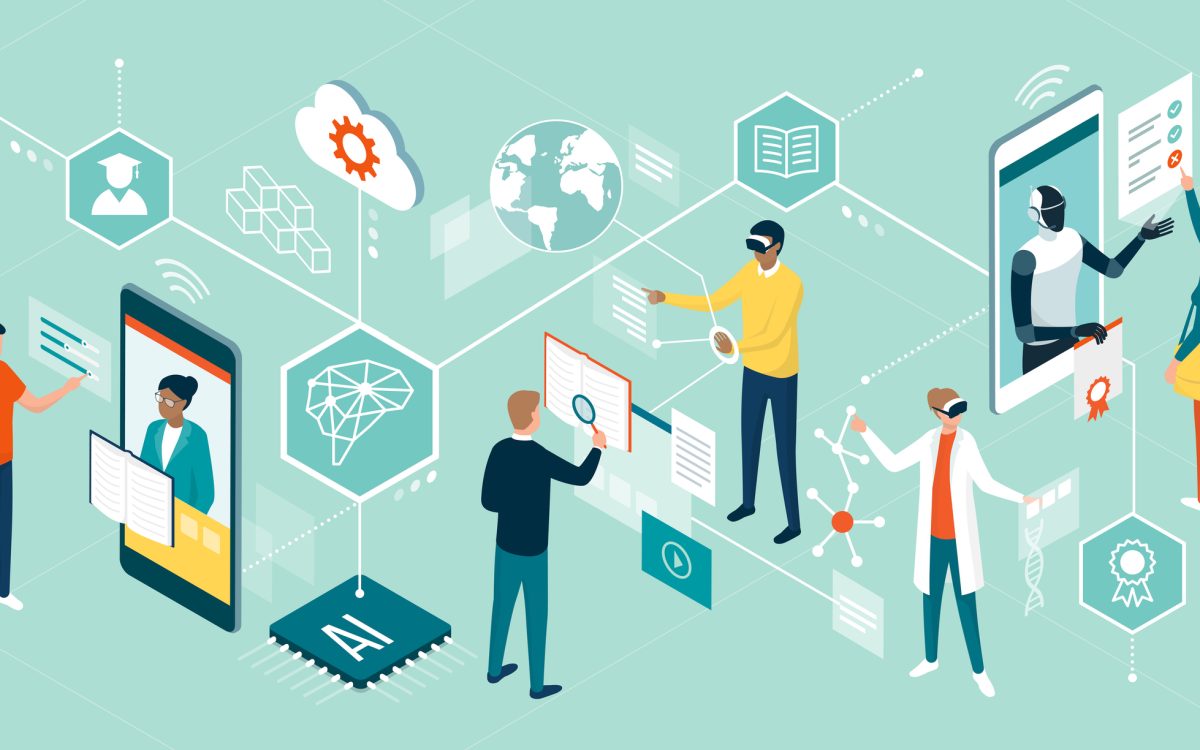Your new digital assistant: Using AI to unlock a more productive and creative workplace
|
Getting your Trinity Audio player ready...
|
Have you ever daydreamed about having an assistant to take on administrative work, so you could focus on your clients and developing innovative programs to support them? You’re probably not alone. Enter artificial intelligence (AI), with a superhero cape flying in the background. The role of AI is evolving, and as it does, we need to start thinking about evolving our understanding of its capabilities and how it can support us, like a digital assistant.
International consulting firm Gartner outlines five stages of AI interaction in the Gartner AI Maturity Model.
Level 1: Awareness – early interest with risk of overhyping
Level 2: Active – AI experimentation
Level 3: Operational – process optimization, service innovations (creating value)
Level 4: Systemic – used for digital process and chain transformation (new digital business models)
Level 5: Transformational – part of day-to-day business operations.
A year after ChatGPT went mainstream, what’s it doing for you now? Is your experimentation phase fading – or even over? If artificial intelligence has just become something you read about in headlines, you may be missing out. However, if you’re stuck at levels one or two of the Gartner AI Maturity Model, there’s good news! You have lots of opportunity to engage more deeply with AI tools to benefit your work in career development. This article aims to reignite your awareness of ChatGPT and encourage you to consider how you can use this tool to advance workplace operations, systems and transformation.
Diving into data
Neil Patel, a well-known leader in the digital marketing industry and New York Times bestselling author, suggests, “Everyone is using AI for writing content, but this is [not the only] way to use AI.” While we believe AI can be a useful tool to support writing, we agree with Patel’s suggestion that using AI for data analysis can be even more effective.
For example, imagine you’ve conducted a workshop and asked your participants to complete a survey. The last question of your survey might ask for recommendations of other topics to include for your next workshop.
You might dump the raw data from your survey into ChatGPT and ask it to sort, then itemize, the top three requested workshops to consider for the year ahead.
In essence, you’re able to use AI as a digital assistant to turn your unstructured data (surveys) into useful insights.
Here’s how:
- Assemble your data. This might be surveys, reports, intake forms and maybe even reports you complete for your funder.
- Upload the relevant data into ChatGPT.
- Depending on the data you want to synthesize and distill into meaningful reports, you can prompt it in any number of ways. For instance:
- Prompt: Identify the number of clients we saw this month who required resume writing services.
- Prompt: Repeat this and add a field for clients under the age of 24.
- Prompt: Repeat this and add a field for people identifying as female.
Prompt: Create a detailed report outlining the gaps in services found within our programs for people identifying as female, under the age of 24, looking for resume writing services.
Prompt: Imagine you’re a client requiring resume writing services, under the age of 24, identifying as female. Based on the information provided above, what themes are evident in the data that could be used to upgrade our employment program/services?

Let’s try another example
Imagine you have a job search workshop designed for the general public. You want to customize your workshop to different groups. For this example, let’s use three different groups: A) military members B) newcomers to Canada and C) people over the age of 50.
A) Military members
You might find a recent report written on the job satisfaction of military members or the challenges they face when transitioning from the military to a civilian career.
- Prompt: Educate me about the challenges faced by military members as they transition to civilian jobs.
- Prompt: Ask me 50 questions about this audience to ensure I am considering things I might not otherwise have awareness of. [Supporting you to engage in divergent thinking]
- Prompt: Review my job search workshop [enter content] and identify how to revise my workshop for a military audience.
You can do the same for any other group your work with. Use the technology to expand your understanding and leverage it to teach you to improve your workshops, services, programs and products.
B) Newcomers to Canada
Prompt: imagine you’re a newcomer to Canada in need of job search services. You’ve never looked for work in Canada, but you are a hard worker ready to take a job. What do you do first?
Prompt: What is inadequate about the advice above?
“AI can identify things we, as career professionals, might miss.”
This is how you lean into the hallucinations – false or misleading information presented as fact – of ChatGPT. You use it, getting ChatGPT to work for you to create something better than what you started with. Use the answers to revise your workshop to be much more meaningful to your target audience.
C) People over the age of 50
Prompt: Imagine you’re a jobseeker over the age of 50 and you’re feeling vulnerable about your age. What are some things that might put you at ease right away?
ChatGPT gave me 19 tips when I gave it this prompt. I followed it up with this:
Prompt: What does the advice above miss?
It gave me 15 ways the advice it had provided fell short! AI can identify things we, as career professionals, might miss.
ChatGPT shared things like: age bias, technology proficiency, updating online presence, addressing employment gaps, adapting to change, disclosing health concerns, emotional support and being overqualified to name a few. What I found surprising was how quickly it came up with a list of 15 items. I might have come up with three or four on my own, but nothing as comprehensive as a list of 15. This got me thinking, what else might I have missed, even with the help of ChatGPT? How might I gain a deeper understanding of this client segment?
Can you now start to imagine how you might use AI more as a digital assistant than a helpful word processor?
The evolving role of AI as a digital assistant
There’s no question: The evolving role of AI as a digital assistant can foster workplace productivity and creativity. Of course, AI is not a standalone solution; it’s a tool that can amplify human capabilities and transform organizations. Progressing through the Gartner AI Maturity Model – from experimentation to operational, systemic and transformational stages – demonstrates the increasing value for career professionals of using AI in data analysis, informed decision-making and customization for diverse audiences.
Whether you’re at level one, two, three, four or five – there is always more to learn. Will you embrace the challenge of progressing through the Gartner AI Maturity Model within your own workplace? As technology advances, the path to excellence in AI adoption is one career professionals cannot afford to ignore.




